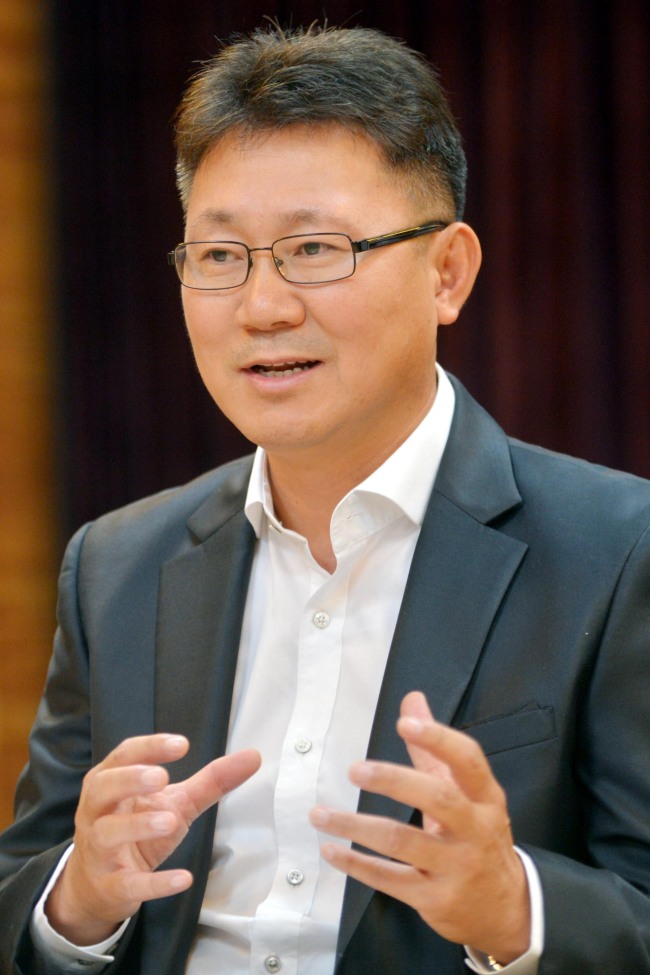Arts school works to give students a fighting chance
By Korea HeraldPublished : Sept. 15, 2013 - 20:33
This is the sixth in a series on producers, MCs, DJs and artists working in the Korean underground hip-hop scene. ― Ed.
Most entertainers, musicians and actors will agree that an academic degree is not always necessary for a career in entertainment. But nowadays, just like most of the working world, it’s harder to get jobs based on talent alone. Young job seekers need a set of skills and techniques along with talent.
That is what Korea Conservatory, an arts school based in Apgujeong-dong, is hoping to give to its students so that as soon as they graduate, they can land a job in the field they choose.
“We’re focused on practical techniques. We’re trying to do a union of art and technology together. So that means, after graduation they can get a job,” said dean of external affairs Kang Jun.
Most entertainers, musicians and actors will agree that an academic degree is not always necessary for a career in entertainment. But nowadays, just like most of the working world, it’s harder to get jobs based on talent alone. Young job seekers need a set of skills and techniques along with talent.
That is what Korea Conservatory, an arts school based in Apgujeong-dong, is hoping to give to its students so that as soon as they graduate, they can land a job in the field they choose.
“We’re focused on practical techniques. We’re trying to do a union of art and technology together. So that means, after graduation they can get a job,” said dean of external affairs Kang Jun.

The 12-year-old school has more than 200 students studying music, acting and dance. Korea Conservatory has departments in contemporary music, applied music and music production, with the music production department focusing on teaching students the ins and outs of the hip-hop industry, from producing, rapping and singing to DJing. Many of Korean hip-hop’s top rappers and producers teach at the department, according to the department manager Albert Kheem.
The school offers a unique network, with many of the professors currently at work in their fields. Dean Kang, who recently arrived at the school, for example, has 25 years of experience and networking in the entertainment industry, with the last few at K-pop events working on putting together concerts all over Asia.
“The only thing I can give to my students is that I have all kinds of experience and connections, so I bring that from Asia and the United States, all kinds of media and music, art, film things,” Kang said. “I can combine (that) with my students, that relationship.”
Kheem added that what sets the school apart from others is its focus on students’ career paths and the fact that its professors are all working professionals.
A new addition to the school’s curriculum, the music production department has been around three years and offers students a four-year or two-year degree in rap or soul vocals, small hip-hop production and arrangement, and DJ EMP.
According to Kheem, the course is extensive with students required to create 10 songs per month with many workshops and performances that are then graded by the professors, who are a who’s who of Korean hip-hop. The list includes MC Meta, Jason Park, producer for Tiger JK, Yoon Mirae and Bizzy, Nuck from Soul Dive, RHYME-A, and more, with other big names in the industry set to join next semester. The department also supports the production of a studio-grade album.
A hip-hop artist and producer, who is also a member of Tiger JK’s Movement Crew, Kheem said that when Korean hip-hop got its start 15 years ago, there was no one to teach the new rappers and producers what to do. They had to learn on their own, which is what led him and his fellow professors to step into the classroom.
“At that time, we were always curious about how to do it but nobody could answer. We’re kind of pioneers. After 10 years, we have enough knowledge on how to make hip-hop songs, albums, how to produce a show, promotion. Now we think we should share our knowledge,” he said.
Kheem explained that at some point the students would graduate and enter the industry, and their professors and mentors would become their competition in a market that was still relatively small.
He said the department was changing as well, despite its short history. When it started, 80 percent of the students majored in rapping. But now, many are realizing the importance of knowing the business side of hip-hop and about 60 percent study producing and composing with 40 percent focusing on rapping.
By Emma Kalka (ekalka@heraldcorp.com)
-
Articles by Korea Herald



![[KH Explains] Hyundai Motor’s plan for new landmark keeps hitting bumps](http://res.heraldm.com/phpwas/restmb_idxmake.php?idx=644&simg=/content/image/2024/05/13/20240513050626_0.jpg&u=20240513192803)
![[Grace Kao] American racism against Stray Kids](http://res.heraldm.com/phpwas/restmb_idxmake.php?idx=644&simg=/content/image/2024/05/13/20240513050827_0.jpg&u=)














